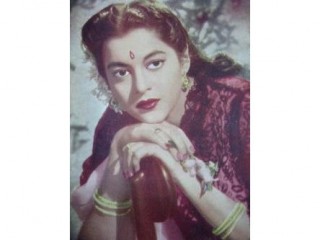
Nalini Jaywant biography
Date of birth : 1926-02-18
Date of death : -
Birthplace : Bombay, British India
Nationality : Indian
Category : Arts and Entertainment
Last modified : 2011-09-07
Credited as : Bollywwod actress, ,
1 votes so far
She was married to director Virendra Desai in the 1940s. Later, she married her second husband, actor Prabhu Dayal, with whom she acted in several movies.
In her teens, she got some prominence through her performance in Mehboob Khan's Bahen (1941), a movie about a brother's obsessive love for his sister. The movie had strong shades of incest. She performed in a few more movies before the notable Anokha Pyaar (1948). The movie involved a love triangle among characters played by Dilip Kumar, Nargis, and Nalini, Nalini's character sacrificing her love for the hero played by Dilip Kumar. Nalini's performance in that movie proved to be the movie's saving grace.
1950 was a breakthrough year for Nalini when she became a top star with her performances opposite Ashok Kumar in Samadhi and Sangram. Samadhi was a patriotic drama concerning Subash Chandra Bose and the Indian National Army. Though the leading movie magazine of the day, Film India, called it politically obsolete, it enjoyed big success at the box office. The song Gore Gore O Banke Chhore sung by a Lata Mangeshkar and Ameerbai Karnataki for Nalini's character in Samadhi had become immensely popular. Sangram was a crime drama wherein she played the heroine reforming the anti-hero. Nalini and Ashok Kumar performed together in several more movies: Kafila (1952), Naubahar (1952), Saloni (1952), Mr. X (1957), and Sheroo (1957).
Nalini remained an important leading actress through the mid-1950s. Movie makers K. A. Abbas (Rahi), Ramesh Saigal (Shikast and Railway Platform), and Zia Sarhady (Awaaz) extended Nalini Jaywant's association with realistic movies, while movie makers Mahesh Kaul (Naujavan (1951)) and AR Kardar (Jaadu) developed her musical persona. She performed admirably in successful Filmistan musicals like Nastik (opposite Ajit), Munimji (opposite Dev Anand), Hum Sab Chor Hain (opposite Shammi Kapoor).
The 1958 movie Kaala Pani, directed by Raj Khosla, was Nalini's last successful movie. That year, she won the Filmfare Best Supporting Actress Award for her performance in that movie as a shady nautch girl, Kishori, who formed a "key witness" in framing the hero's father for a murder. Her come-hither mujra in S. D. Burman's composition Nazar Laagi Raaja Tore Bangle pe and her tearful looks at Dev Anand from across the room in Burman's Hum Bekhudi Mein were memorable.
Bombay Race Course (1965) was Nalini's last main movie, though she did make a comeback of sorts playing a blind mother in Nastik (1983). (This Nastik had no connection with Nastik(1954) in which she had starred.)
Actor Dilip Kumar considered Nalini as the greatest actress he ever worked with, citing her instinct for grasping the essence of a scene as second to none. A Filmfare poll in the 1950s named her the most beautiful woman in the Indian movie world. She acted opposite all top actors of her time, barring Raj Kapoor, in hit movies like Samadhi (1950), Jaadu (1951), Nastik (1954), Munimjee (1955), Mr. X (1957), and Kaala Pani (1958). She received much critical acclaim for her performances in Rahi (1952), Shikast (1953), Railway Platform (1955), and Awaaz (1956). Nalini Jaywant died on the afternoon of 20 December 2010 in tragically lonely circumstances at her bungalow of 60 years at Union Park, Chembur, Mumbai.
Selected filmography:
Nastik (1983)
Bombay Race Course (1965)
Kaala Pani (1958)
Sheroo (1957)
Mr. X (1957)
Hum Sab Chor Hain (1956)
Durgesh Nandini (1956)
Awaaz (1956)
Railway Platform (1955)
Munimjee (1955)
Nastik (1954)
Kavi (1954)
Baap Beti (1954)
Shikast (1953)
Rahi (1952)
Naujawan (1951)
Jaadu (1951)
Sangram (1950)
Samadhi (1950)
Anokha Pyaar (1948)
Bahen (1941)
















